about 95%
Early-stage (stage I-II)about 50%
Mid-stage (stage III)about 10% to 12%
Late-stage (stage IV)Why do you get parotid cancer?
🟢Environmental factors. Frequent exposure to X-rays and other radioactive substances, or frequent participation in heavy metal processing work, may cause parotid cancer.
🟢Family history. People with a family history of parotid cancer have a higher risk of disease than those without a history.
🟢Infectious factors. If the patient is infected with the Epstein-Barr virus and causes mumps, and the condition is not controlled for a long time, the incidence of parotid cancer may increase.
🟢Unhealthy lifestyle. Long-term smoking, harmful substances in tobacco such as nicotine can cause cell DNA damage and mutation, thereby increasing the risk of parotid cancer; long-term alcoholism will also increase the risk of disease.
01
Painless ear lumps: Painless lumps caused by parotid cancer are mostly nodular, usually appearing below or behind the earlobe, and have the characteristics of slow growth and mobility.02
Facial paralysis: If the facial nerve is invaded, facial paralysis will occur, which is manifested by symptoms such as crooked corners of the mouth and inability to close the eyes.03
Limited mouth opening: Patients will have difficulty opening their mouths.04
Abnormal secretions: Once mumps cause the skin of the lesion to be infiltrated, causing abnormal ulceration of the skin, the wound will produce foul-smelling secretions due to infection.05
Hearing impairment: The tumor destroys the external auditory canal and eustachian tube, causing patients to have hearing impairment, tinnitus, deafness, etc.06
Enlarged lymph nodes: Enlarged parotid lymph nodes or cervical lymph nodes cause patients to experience symptoms such as inability to turn their necks normally, soreness, numbness, and pain.
Integrated Minimally Invasive Treatment x St. Stamford Modern Cancer Hospital Guangzhou
1、No need for resection, high surgical precision, and fewer complications: Minimally invasive treatment can protect parotid tissue, facial blood vessels and nerves to a great extent, and enter the parotid gland through a tiny incision for high-precision treatment operations, greatly reducing complications such as postoperative infection.Traditional treatments for parotid cancer
Surgery, radiotherapy, chemotherapy, hormone therapy, etc.

Interventional Therapy
local precise drug infusion delivers a drug concentration 2-8 times higher than systemic chemotherapy, resulting in less trauma and fewer side effects.

Cryotherapy
Using a 2mm cryoprobe, lung tumors can be efficiently ablated in ten minutes after undergoing 2 cycles of cooling and rewarming.

Particle Knife
Particle implantation therapy, commonly known as "particle knife", is a minimally invasive treatment method newly invented by the international medical community in response to the inadequacy of surgery and external radiotherapy.
about 80% to 90%
Early-stage (stage I-II)about 50% to 60%
Mid-stage (stage III)about 20% to 30%
Late-stage (stage IV.)Why do you develop oral cancer?
🟢Poor oral hygiene. Bacteria, mold, etc. breed and spread in the oral cavity, combined with inflammation, etc., causing some cells to proliferate and become more sensitive to carcinogens.
🟢Smoking and drinking. Research shows that smoking is significantly related to the incidence of oral cancer (including tongue cancer). The earlier you smoke and the longer you smoke, the higher the risk. If you smoke 15 cigarettes + drink 2 taels of alcohol a day, the incidence of oral cancer is 7.28 times higher than that of ordinary people.
🟢Long-term foreign matter irritation. Prolonged irritation by residual roots or crowns of teeth, sharp tips, ill-fitting dentures, chewing betel nut, and betel nut mixtures increase the cell division activity of the oral mucosa, producing chronic inflammation and causing cancer.
01
Ulcers or lumps: Oral cancer often manifests as ulcers or lumps in the mouth that do not heal for a long time, especially ulcers that are ineffective in treatment, which should be vigilant.02
Oral bleeding: Persistent oral bleeding is a common symptom of oral cancer, especially bleeding without obvious reasons, such as bleeding gums and oral mucosa.03
Foreign body sensation in the mouth: Patients may feel a foreign body sensation in the mouth and a sense of obstruction in the pharynx, which may be caused by tumor compression.04
Pain in the mouth: Oral cancer patients often feel persistent pain in the mouth, which cannot be relieved by general drugs.05
Difficulty in eating and chewing: Oral cancer can affect oral function, leading to difficulty in eating and chewing, and even difficulty in swallowing.
Integrated Minimally Invasive Treatment x St. Stamford Modern Cancer Hospital Guangzhou
1、No need for resection, high surgical precision, and fewer complications: Minimally invasive treatment can greatly protect the oral and maxillofacial tissues, and highly precise treatment operations through tiny incisions greatly reduce postoperative infections.Traditional treatments for oral cancer
Surgical resection, radiotherapy, chemotherapy, hormone therapy, etc.
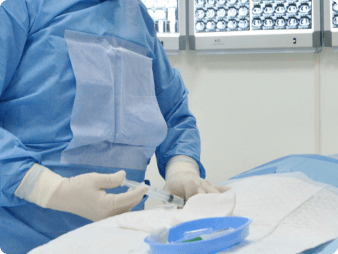
Interventional treatment
local precise drug infusion delivers a drug concentration 2-8 times higher than systemic chemotherapy, resulting in less trauma and fewer side effects.
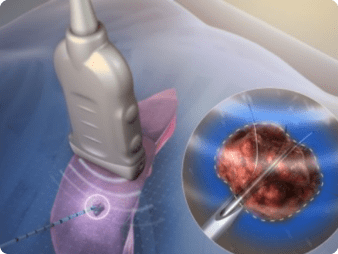
Radiofrequency Ablation
Radiofrequency ablation, sometimes referred to as RFA, is a minimally invasive treatment for cancer. It is an image-guided technique that heats and destroys cancer cells.
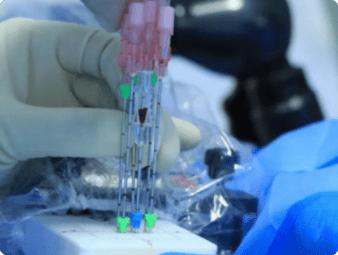
Particle Knife
Particle implantation therapy, commonly known as "particle knife", is a minimally invasive treatment method newly invented by the international medical community in response to the inadequacy of surgery and external radiotherapy.
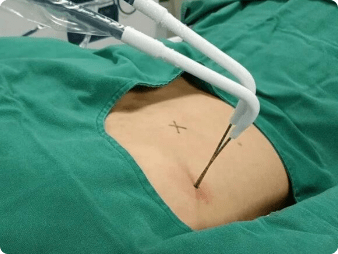
Cryotherapy
Using a 2mm cryoprobe, lung tumors can be efficiently ablated in ten minutes after undergoing 2 cycles of cooling and rewarming.
about 80% to 90%
Early-stage (stage I-II)about 50% to 60%
Mid-stage (stage III)about 20% to 30%
Late-stage (stage IV.)Why do you get tongue cancer?
🟢Chronic infections. Inflammation or ulcers on the tongue that do not heal for a long time tend to become cancerous.
🟢Undernourishment. Vitamin A deficiency can cause tongue mucosal epithelial thickening and hyperkeratosis, leading to tongue cancer. Some studies also believe that diets low in iron and zinc may induce tongue cancer.
🟢Chemical Factors. Aromatic hydrocarbons in tobacco have carcinogenic effects. Long-term drinking of hard liquor has a higher chance of developing tongue cancer than people who do not drink. Smoking and alcohol stimulation are one of the causative factors of tongue cancer.
🟢Long-term foreign body irritation. Chewing betel nut and betel nut mixture can increase the division of oral mucosal cells and cause tongue cancer.
🟢Leukoplakia of the mucous membrane. Oral mucosal leukoplakia is a precancerous lesion, and the tongue is a common site for leukoplakia.
01
Ulcers: Tongue cancer often causes ulcers, which are typically hard, irregularly raised edges, and uneven bases. Ulcers can cause severe pain, salivation, bad breath, tongue movement disorders, chewing, speech, swallowing and other functional disorders after secondary infection.02
Pain: Pain often occurs with ulcers, and in severe cases can radiate to the ears or temporal area.03
Limited tongue movement and bradymasesis: When the tumor invades the deep muscles of the tongue, symptoms such as limited tongue movement, difficulty chewing, and slurred speech may occur.
Integrated Minimally Invasive Treatment x St. Stamford Modern Cancer Hospital Guangzhou
1、No need for resection, high surgical precision, few complications: Minimally invasive treatment can greatly protect the tongue tissue and function, and highly precise treatment operations through tiny incisions can greatly reduce postoperative infections.Traditional treatments for tongue cancer
Surgical resection, radiotherapy, chemotherapy, hormone therapy, etc.

Interventional treatment
local precise drug infusion delivers a drug concentration 2-8 times higher than systemic chemotherapy, resulting in less trauma and fewer side effects.
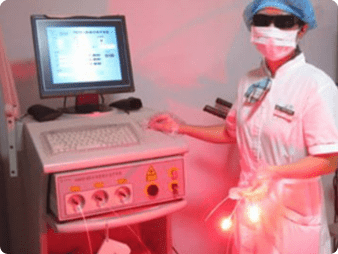
Photodynamic Therapy
Photodynamic therapy (PDT) is a treatment that uses a drug, called a photosensitizer or photosensitizing agent, and a particular type of light.

Particle Knife
Particle implantation therapy, commonly known as "particle knife", is a minimally invasive treatment method newly invented by the international medical community in response to the inadequacy of surgery and external radiotherapy.

Cryotherapy
Using a 2mm cryoprobe, lung tumors can be efficiently ablated in ten minutes after undergoing 2 cycles of cooling and rewarming.